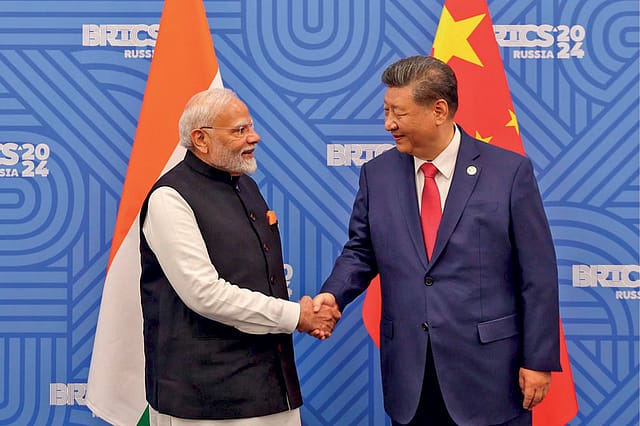Building Castles with Bricks without Mortar

The Kazan summit of BRICS, with new members, aspirants and observers, looked like an effort to build castles in the air without any mortar to hold the bricks together. Gone are the days when states joined intergovernmental organisations with a common agenda even if there were differences to be ironed out to come to a consensus on issues. Here it was like the shoppers joining the line without knowing what was on sale, like in the old Soviet Union. The diversity was so wide even among the four original members, chosen by an American economist without any expectation that his BRIC will ever become an organization. But in five years, South Africa was added to it because it was a member of a grouping among Brazil, India and South Africa (Brazil, India and South Africa Dialogue Forum). China saw in the grouping a possibility of building an alternative to the Bretton Woods Institutions, though India and Brazil were not aggressive about it.
In about ten years, BRICS formed an organization, set up a BRICS Bank in Beijing with an Indian CEO and began credits to members in need to counter the World Bank and IMF monopoly. Several structures were created to pave the way for de-dollarization of the world. Before the Kazan summit, a proposal for an alternate global currency was ready for final approval. China also managed to expand the membership with the addition of Iran, Egypt, Ethiopia and the UAE, though India was initially opposed to such an expansion. In effect, it became a counter to G- 7, but the summit ended with an uneasy peace between them because of India and Russia.
Imran Khan: Pakistan’s Prisoner
27 Feb 2026 - Vol 04 | Issue 60
The descent and despair of Imran Khan
The biggest winner of the summit was Russia because it was held on its soil at a time when Russia was sought to be isolated and friendless. Putin invited Modi to the summit personally during the latter's visit to Moscow, hinting at the anti-terrorist character of the organization, without showing any interest in mediation by anyone. Russia also did not want to upset the present financial balance, which has given it some advantages. It was rumoured that the US had exerted pressure on India not to embrace the new currency to the extent of raking up the Pannun controversy!
China also has reason to be happy about the summit as the new BRICS had strengthened itself and China's claim for the leadership of the Global South was established. China agreed to a return to the border situation of 2020 through an engagement process and by making the agreement made public in Moscow, giving a part of the credit to Putin. But much more remains to be achieved to return to 2020. It will be hard to dismantle the structures built by both sides. The border negotiators will meet to find an agreement on the LOAC, but the road ahead is much more arduous than before.
India seems to have played its cards well to reach an agreement with China in Russia, involving the international community in the bargain. The next step will be to reinstate the seminal agreements of the past as a basis for delineating the border. PM Modi was able to gain some acceptance as a mediator not only on Russia-Ukraine, but also Iran-Israel issue, with the endorsement of the President of Iran. But Zelenskyy's comment about Nobel hunters at the expense of Ukraine has dented the mediation efforts.
The stage has been set for a struggle for the leadership of the Global South between China and India and even Russia, seeing itself as a developing nation. It is interesting that in the extended BRICS, India is not the only country which has not joined the Chinese Belt and Road Initiative. In a setback to China, Brazil has decided not to be a part of BRI. Even otherwise, BRI stands discredited for various reasons. But most developing countries, particularly in Africa, have great hopes of a flow of funding and technology from China. Bringing the entire African Union into G-20 was a popular initiative, but that has not resulted in any flow of resources.
The participants in the Kazan summit returned with whatever they could get from BRICS, but the organization itself did not have much to offer. If anything, it has diluted its economic agenda and retreated from de-dollarization. It was basically bilateralism in the guise of multilateralism. A new bipolar world has not yet emerged.
